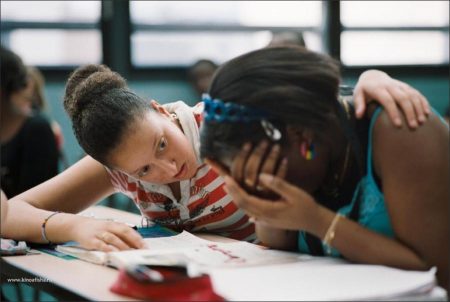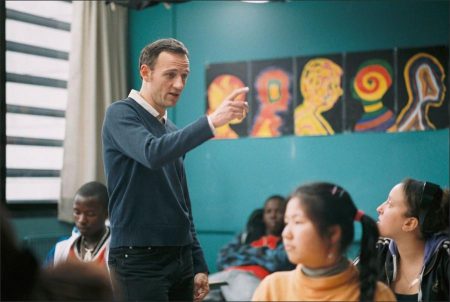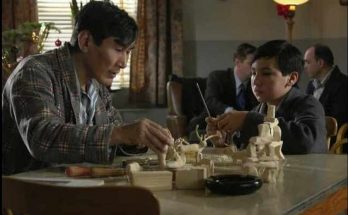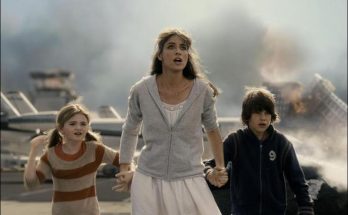Taglines: The dynamics of a multicultural class and its teacher will enlighten.
The Class movie storyline. Teacher François Marin and his colleagues are preparing for another school year teaching at a racially mixed inner city high school in Paris. The teachers talk to each other about their prospective students, both the good and the bad. The teachers collectively want to inspire their students, but each teacher is an individual who will do things in his or her own way to achieve the results they desire. They also have differing viewpoints on the students themselves, and how best to praise and discipline them.
The administration of the school tries to be as fair as possible, which includes having student representatives sit on the student evaluation committee. Marin’s class this year of fourteen and fifteen year olds is no different than previous years, although the names and faces have changed. Marin tries to get through to his students, sometimes with success and sometimes resulting in utter failure. Even Marin has his breaking point, which may result in him doing things he would probably admit to himself are wrong. But after all is said and done, there is next year and another group of students.
Entre les murs (English: The Class; lit. Between the Walls) is a film directed by Laurent Cantet, based on the 2006 novel of the same name by François Bégaudeau. The film received the Palme d’Or at the 2008 Cannes Film Festival, making it the first French film in 21 years to do so. The last one was Sous le soleil de Satan by Maurice Pialat. The novel is a semi-autobiographical account of Bégaudeau’s experiences as a literature teacher in an inner city middle school in Paris. The film stars François Bégaudeau in the role of the teacher. Director Laurent Cantet shot multiple improvised takes of real students and a real teacher using three cameras to make “The Class.
Learning to Be the Future of France
“The Class” was shown as the opening-night selection of this year’s New York Film Festival. Following are excerpts from Manohla Dargis’s review, which appeared in The New York Times on Sept. 26.
The young bodies crowding “The Class,” an artful, intelligent movie about modern French identity and the attempt to transform those bodies into citizens through talk, talk, talk, come in all sizes, shapes and colors. With their cellphones and pouts, these bored, restless junior high students look pretty much like the fidgety progeny of Anytown, U.S.A. One difference being that these African, Arab and Asian Parisians live in a country that insists its citizens have only one cultural identity, even if it is an identity— as France’s smoldering suburbs vividly suggest — many of these same young people don’t feel welcome to share.
“The Class” isn’t directly about civil unrest and French identity as a republican ideal, though these issues run through it like a powerful current, keeping the children and adults (and the filmmaking) on edge. Rather, the director, Laurent Cantet — using a small team and three high-definition video cameras — keeps a steady eye on the children, these anxious, maddening little people flailing and sometimes stalling on the entryway to adulthood. He shows them giggling, arguing, boldly and shyly answering questions. He marks their victories and failures and, with brutal calm, shares some of the other lessons schoolchildren learn on their way to the office, factory, shop, unemployment line and perhaps even prison: sit down, raise your hand, stand up, get in line, keep quiet.
That’s tough stuff, but “The Class” slides its points in at an angle, letting them emerge from the children’s chatter instead of hanging its politics around these tender necks like placards. For audiences accustomed to big-screen pedagogical imperatives soaked in guilt and deep-fried in piety, this makes for an exotic change (though the HBO show “The Wire” covered similar ground) and might sound perilously dry. But “The Class,” which won the Palme d’Or at the Cannes Film Festival in May and opens the New York Film Festival on Friday night, is as much an emotional experience as a head trip. Mr. Cantet would prefer you to think (he is a French filmmaker, after all), but he’s enough of an entertainer to milk an occasional tear.
Just about as tightly focused as a documentary by Frederick Wiseman, the story unfolds almost entirely inside a school in the working-class, fast-gentrifying 20th arrondissement, a residential district on the city’s farthermost eastern edge. You don’t see much of the neighborhood (its most famous residents are taking the big sleep in the Père-Lachaise Cemetery), though you do get to know several dozen of its younger inhabitants. A rainbow coalition of sullen boys and mouthy girls ages 13 and 14, the students are meant to be learning the finer points of the French language, parsing the differences between the passé composé and the imparfait, distinctions that seem nearly as foreign to them as does the reedy young teacher down in front.
One of the most remarkable things about “The Class” is that this quietly stubborn, prickly man is François Bégaudeau, who wrote the autobiographical novel on which the movie is based. (In France the original title for both is “Between the Walls.”) Like the students, the administrators and other teachers — all culled from the same school in the 20th — Mr. Bégaudeau is playing a fictionalized version of himself developed through weekly workshops, improvisations and a shoot that lasted a full academic year. Like Mr. Cantet’s shooting style in this movie, he initially comes across as free-flowing, even loose, a guy whose jocular teasing suggests that he wants to be seen more as a friend than as an authority figure, one of us rather than one of them.
He isn’t, which proves this classroom’s most difficult, painful lesson. Over the course of the year, François pushes and prods at his students, encouraging a bashful Chinese boy, Wei (Wei Huang), and trying to navigate around two pint-size terrors — a lippy Arab girl, Sandra (Esméralda Ouertani), and a belligerent African heartbreaker, Souleymane (Franck Keïta) — who test his patience with unsettling effectiveness. Souleymane, son of Malian immigrants, flashes some Arabic tattooed on his arm, challenging everyone with the barely suppressed rage that radiates off him at times like a fever. Sandra, meanwhile, in one of the story’s few false notes, announces that she has read “The Republic” on her own time, a revelation that feels more directed at the audience’s prejudices than at François’s.
Despite this Platonic nod, Mr. Cantet, who shares the screenwriting credit with Mr. Bégaudeau and Robin Campillo, tends to keep his ideas more strategically nestled in the unassuming guise of a documentary-inflected realism that plays a lot like life because that’s precisely where it comes from. Here Mr. Cantet — whose earlier features include “Human Resources” and “Time Out,” two other dramas about systems of power — has done that rarest of things in movies about children: He has allowed them to talk. There’s no question that he’s occasionally overeager to speak on their behalf, but he’s listening too, engaged in a conversation that’s as urgently necessary in this country as it is in France. And, just in case you don’t have a festival ticket, rest easy: “The Class” will open later this year.
Continue Reading and View the Theatrical Trailer
The Class (2008)
Entre les Murs
Directed by: Laurent Cantet
Starring: François Bégaudeau, Nassim Amrabt, Laura Baquela, Cherif Bounaïdja Rachedi, Agame Malembo-Emene, Angélica Sancio, Arthur Fogel, Burak Özyılmaz, Dalla Doucoure, Esmeralda Ouertani
Screenplay by: Robin Campillo, Laurent Cantet
Prodüksiyon Tasarımı: Michel Dubois
Cinematography by: Pierre Milon
Film Editing by: Robin Campillo
Costume Design by: Marie Le Garrec
MPAA Rating: PG-13 for language.
Distributed by: Sony Pictures Classics
Release Date: December 19, 2008
Views: 74






